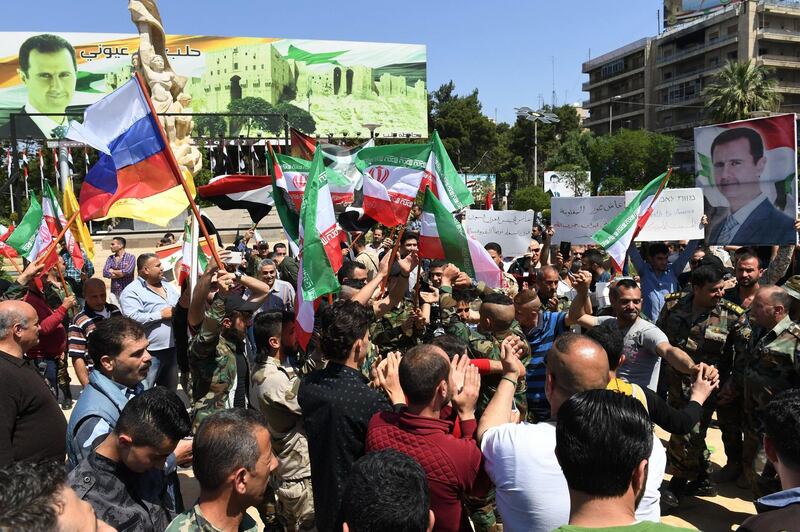Syrian President Bashar Al Assad said Western strikes on government military installations only made him more keen to fight back against his opponents.
"This aggression will only make Syria and its people more determined to keep fighting and crushing terrorism in every inch of the country," Mr Al Assad told his Iranian counterpart Hassan Rouhani in comments published by his office Saturday.
Hundreds of Syrians gathered at landmark squares in the Syrian capital Saturday, honking car horns and waving Syrian flags in scenes of defiance that followed unprecedented joint airstrikes by the United States, France and Britain.
Soldiers threw up two fingers to flash the victory sign near a car with pictures showing the president, his late father Hafez Al Assad and ally Hassan Nasrallah, who heads the Iran-backed Lebanese Shiite movement Hezbollah.
While US President Donald Trump declared "Mission Accomplished!" in a tweet on Saturday, Syria distributed video of President Al Assad walking calmly into work carrying a briefcase.
"Good souls will not be humiliated," Syria's presidency tweeted after the airstrikes began.
صباح الصمود..
— Syrian Presidency (@Presidency_Sy) April 14, 2018
رئاسة الجمهورية العربية السورية pic.twitter.com/hhIZT6cOTe
Russia, Iran and Hezbollah rallied around the Syrian regime, warning that the missile strikes would have consequences but stopped short of threatening retaliation.
Russia said none of the more than 100 cruise missiles fired early on Saturday entered airspace covered by Russian air defence systems, easing worries of an escalation into wider conflict.
Russian President Vladimir Putin condemned the Syrian attacks as an “act of aggression” but his statement did not mention retaliatory strikes, easing for the moment fears of a wider conflict.
"Russia will convene an emergency meeting of the UN Security Council to discuss the aggressive actions by the US and its allies," Vladimir Putin said.
There were no casualties, either Syrian or Russian, or serious damage inflicted, the Defence Ministry in Moscow said.
.@mod_russia : of 103 missiles, 71 intercepted by Syria’s air defences. No serious damage at airfields. Two former industrial sites hit with no people or equipment in place.https://t.co/7g05zNTWoX pic.twitter.com/0qqNZ2Pfvu
— Russian Embassy, UK (@RussianEmbassy) April 14, 2018
Iranian President Hassan Rouhani warned on Saturday that a US-led missile attack on Syria would lead to destruction in the Middle East.
"Such attacks will have no result but more destruction ... the Americans want to justify their presence in the region by such attacks," Mr Rouhani said in comments reported by the semi-official Tasnim news agency.
Lebanese movement Hezbollah, an ally of Syria, sharply condemned the missile attack, saying the Western alliance would not achieve their objectives.
"America's war against Syria, and against the region's peoples and resistance movement, will not achieve its aims," the group said in a statement published on its War Media Channel.
_____________
Read more
[ Trump announces air strikes in Syria ]
[ Russia blames UK for staging 'fake' Syrian chemical attack ]
[ UN chief warns that Middle East 'chaos' threatens global peace ]
_____________
The US said Washington was prepared to "sustain" pressure on Mr Al Assad until he ended what President Trump called a criminal pattern of killing Syrians with internationally banned chemical weapons. Mr Trump called the strike "perfectly executed" in his tweet on Saturday.
Turkey welcomed the Western strikes, calling them an "appropriate response" to a suspected chemical attack that left dozens dead in Douma a week ago.
Turkish President Recep Tayyip Erdogan, in a phone call with British Prime Minister Theresa May Saturday, said his country has "clearly condemned" the use of chemical weapons since the beginning, AFP reported.
Mr Erdogan told Mrs May that the only way to long-lasting peace in Syria was a "political solution".
"Turkey considers the operation carried out early this morning by the United States, United Kingdom and France to be an appropriate response to the chemical attack which caused the deaths of many civilians in Douma on April 7," the Turkish foreign ministry said in a statement.
4)Suriye’deki hedeflere ABD,İngiltere ve Fransa saldırısından önce ABD Genelkurmay Başkanı ile Türkiye Genelkurmay Başkanı,Sayın Cumhurbaşkanımız ve Sayın Trump’ın talimatlarıyla görüştüler.
— Bekir Bozdağ (@bybekirbozdag) April 14, 2018
Türkiye,saldırı öncesi bilgilendirildi.
Saldırıda İncirlik Üssü kullanılmadı.
The Syrian government has repeatedly denied any use of banned weapons.
European Council on Foreign Relations senior policy fellow Julien Barnes-Dacey said the impact of the strikes will be “very limited”.
"This might send some immediate short-term message to Al Assad which could limit immediate re-occurrences, but I think that the small nature of the strikes will essentially be seen as a slap on the wrist in Damascus as opposed to a more, deeper western commitment to really shift the regime's behaviour," Mr Barnes-Dacey told The National.
“One of the core problems with the strikes is it was entirely detached from any broader military or political strategy... Trump and Macron, in particular, had been so vocal in asserting that chemical weapons use was a ‘red line’ they felt compelled to take action over and above developing a strategy that might actually be more effective in terms of establishing real deterrence.”
Terrorism expert Dr Afzal Ashraf of Nottingham University also said the strikes were not likely to significantly alter Syria’s position.
“Certainly the messages coming out from Syrian TV showing President Assad going to work, wearing a suit and carrying a briefcase, suggest that they want to send out a message that it is ‘business as usual.’"





